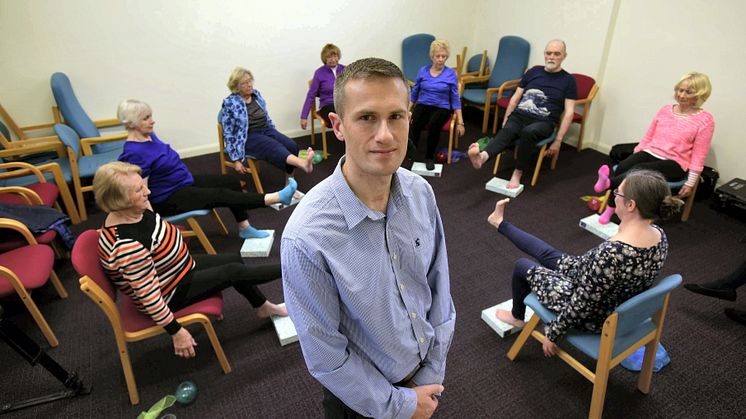
Press release -
Multi-million pound investment to improve region’s health
Northumbria University is among a team of experts in the region who are leading a national project to address health inequalities in the country and the prevention of poor health.
A new government £16 million health improvement programme in the North East and North Cumbria has been awarded to a collaboration of universities, the NHS, local authorities, voluntary organisations, charities and businesses to tackle issues causing health and care inequalities in the region.
The National Institute of Health Research (NIHR) has announced its funding for Applied Research Collaborations (ARCs) to tackle key issues facing our health and social care system, including increasing demands on services due to an ageing population and aspects linked to austerity.
It is the first time that the North East and North Cumbria has received this funding. It will be used to support researchers, practitioners and members of the public who will work together to improve health, shape how care is delivered and develop ideas which will try to give children the best start in life and which help keep people healthier at home for longer.
Themes will focus on aspects such as prevention of poor health, staying healthy with long-term conditions, supporting children and families, integrating health and social care for physical and mental health difficulties, inequalities across communities, using new technology and information to improve lives. Views of patients, their families and members of the public will be sought so that the ARC projects reflect problems that are important to local communities.
Dianne Ford, Pro-Vice Chancellor for Health and Life Sciences, at Northumbria University, said: “Northumbria University is an enthusiastic partner in this important work and we are delighted by the award.
“We bring to the partnership academic excellence in applied health research, implementation science and marginalised groups. This investment recognises the strength of our existing collaborations, the complementarity of our strengths and our drive to make real differences, informed by innovative new approaches, to the region’s health, care and wellbeing.”
Northumbria academics are contributing to all of the themes, leading those relating to Knowledge Mobilisation and Implementation Science; Multimorbidity, Ageing and Frailty; Evaluating Change with Pace & Scale and Inequalities & Marginalised Communities. The latter is being led by the North East North Cumbria ARC nationally.
The ARCs vision for the North East and North Cumbria is to achieve ‘better, fairer health and care at all ages and in all places’.
The core funding provided by the NIHR is £9 million for five years, however, regional partners have contributed an additional £7 million.
The ARC will allow the development of a new team of 23 junior and 11 senior trainee researchers working across universities, healthcare and social care to improve the quality of life for people in the region.
Professor Eileen Kaner from Newcastle University’s Faculty of Medical Sciences, is one of the leaders of the project, which involves 56 organisations in the North East and North Cumbria.
Professor Kaner said: “We are excited about receiving this funding because of the new opportunities it will bring to improve the health and wellbeing of people in the area.
“Our region has challenges due to its geography and there are more health problems that need to be addressed than other parts of the country. Therefore, it is apt that we have been asked by the NIHR to take a national lead on prevention and also on health inequalities.
“The ARC funding allows researchers to focus on the biggest health and social issues in our area and develop real solutions that reflect the needs and views of people living here.
“Much of the work will focus on the lives of people in the community rather than in hospital, especially people with common long-term physical and mental health problems.”
Health Minister Nicola Blackwood said: “As the population grows and demand on the NHS increases, it is paramount we develop the next generation of technologies and improve the way we work to ensure the NHS continues to offer world-leading care.
“The UK has a proud history of cutting edge health research and by supporting the great minds in health and social care, this funding has the potential to unlock solutions to some of the biggest challenges facing healthcare and revolutionise the way patients access treatments in the future.”
Great example of collaboration
One project that will be rolled out across the North East and North Cumbria, as part of the ARC, is a scheme which has successfully doubled the number of pregnant women who quit smoking.
Although many women are aware of the dangers of smoking while pregnant, some need additional support to help stop smoking during pregnancy.
A smoking cessation programme, known as babyClear©, is a key example of cross-sector collaboration that has involved a variety of experts involved in public health issues.
BabyClear© follows the National Institute for Health and Care Excellence (NICE) guidance around smoking in pregnancy by screening pregnant women for smoking using carbon monoxide monitoring.
Any woman still smoking when she first sees a midwife, at around eight weeks into pregnancy, is given information about the risks to their unborn baby and put in contact with agencies that can help support her to quit.
Research revealed that in a study of 40,000 mothers-to-be, the number of women helped to stop smoking due to babyClear© almost doubled.
The team found that women who did not smoke in pregnancy went on to have babies that were more than half-a-pound heavier at full term than those who continued to smoke.
Even women who quit smoking during their pregnancy were shown to have heavier babies than those mothers who smoked throughout pregnancy.
Ends
Topics
Northumbria is a research-rich, business-focused, professional university with a global reputation for academic excellence. To find out more about our courses go to www.northumbria.ac.uk
If you have a media enquiry please contact our Media and Communications team at media.communications@northumbria.ac.uk or call 0191 227 4604.











